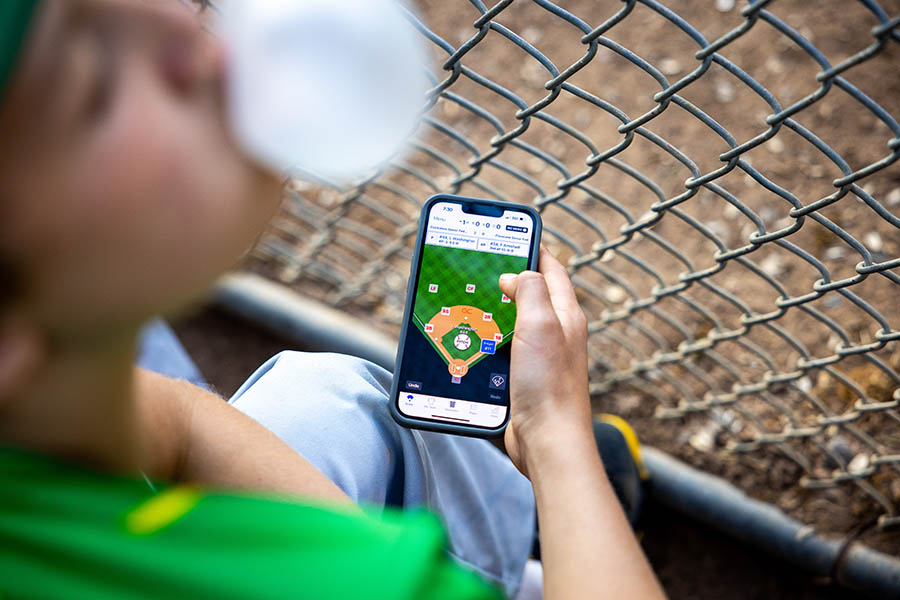A popular app with AI capabilities — fittingly called GameChanger — makes it easier than ever to track and share every moment of a sporting event. The company has upended the world of youth sports and now has its sights on the big leagues.
Mike Marsh had one of the most high-pressure jobs at Tualatin High School’s baseball field at a game one pleasant May evening. But he didn’t have to bat, nor pitch, nor coach. He didn’t even set foot on the diamond.
Marsh was the GameChanger Guy.
For those who haven’t been on the sidelines of youth sports lately, GameChanger is an omnipresent app for livestreaming, scorekeeping and team management. The app has changed the viewing experience for millions of youth-sports participants and families since its founding in 2010 for baseball and softball.
During a game, users can track each pitch, hit, out, run, steal and more. Anyone interested in a team and granted permission from the coach (since these are minors) can watch the video feed. Afterward, users can send around highlight clips or an artificial-intelligence-generated article recapping the game.
Nearly every parent in the stands that day in Tualatin had their phone open to GameChanger to keep track of their seventh- or eighth-grader’s game—the 2023 version of keeping a scorebook with pencil and paper.

“It keeps me focused on the game,” Marsh said. “I don’t get to daydream as much.”
As a team parent for the Cleveland Youth Baseball and Softball program in Southeast Portland, Marsh’s job was to enter all the data from the game in real time. He sat on a wooden bench behind home plate, his cell phone plugged into a camping battery to ensure it didn’t die in the middle of the game.
After all, grandparents across the country — from Salem, Ore., to Florida and North Carolina — were following the game in real time, waiting to see how their middle-school grandsons performed. Marsh’s wife was across town watching their third-grader play baseball live in Southeast Portland while also keeping up with the Tualatin game on the app.
“It’s nerve-wracking,” Marsh told Oregon Business between innings, because he could not speak during game play. “I’ve lost the plot a little before.”
Periodically, the parent who was GameChanging (it’s a verb now) for the opposing team came over to compare data with Marsh. The umpire and the coach relied on him occasionally, too.
“That’s when I get nervous — when the coach comes over,” Marsh said.
About 36 million youth-sporting events happened in the U.S. in 2022; GameChanger scored 6 million of them. It is the No. 1-rated youth-sports app in the country and has been owned by retailer Dick’s Sporting Goods since 2016. About 11,000 Oregon teams use GameChanger, according to the company. It’s available for free on iOS, Android and the web, though users can pay $74.99 a year for a premium subscription, which gets them access to highlight clips, season statistics and “spray charts” of the path of every ball put into play.
GameChanger’s reach extends all the way to Major League Baseball, which announced a multiyear partnership with the company in June. In addition to MLB, the app is wriggling its way into baseball recruiting, journalism and the 19 non-baseball and softball sports now listed on the app, including basketball, football and soccer.
“In two years, families in six or seven of the major team sports will all use GameChanger the way they use it in baseball and softball today,” GameChanger president Sameer Ahuja tells OB. “That’s ambitious, but I am hoping we get there.”
Ahuja’s familiarity with GameChanger began after he started coaching his daughter’s kindergarten softball team in Westchester County, N.Y., in 2014.
“At that age it’s mostly just having fun with them, but it was literally the best part of my week,” he says. “I really took to this coaching thing.”
The app kept the team connected, especially sharing photos of the children with the busy parents who couldn’t make it to every game. In 2017 he got an offer to join the company. “I just kind of jumped in and the rest is history,” he says. Ahuja worked his way up to president in 2021.
Ahuja says he may be a lifer at the company because working there is both interesting and uplifting. (“This is about as wholesome as it gets,” he says.) He loves being known in his community as “The GameChanger Guy,” because of the affection people have for the app.
Once, on a family vacation, he wore a GameChanger T-shirt to the airport, and strangers took photos with him when they learned he was the company president. His daughters, now 13 and 10, were appropriately mortified.
GameChanger merchandise is available at, of course, company parent Dick’s Sporting Goods. One straightforward T-shirt says “Leave Me Alone, I’m Scoring” on the back.
At the beginning of the pandemic in 2020, GameChanger had 45 employees working at the company headquarters in New York, according to Ahuja. Now they have 160 employees working in 30-plus states (three engineers work from Oregon). What changed? In a word: video.

After introducing video in 2020, GameChanger is now the largest streamer in youth sports in the country. Users can watch games like they’re on TV, albeit with poorer video quality than a professional broadcast and only one camera angle, since the filming is typically done with a parent’s phone mounted to the fence behind home plate.
“Customers reach out to us and say this is more valuable to them than their Netflix subscription, which is so cool to hear,” Ahuja says.
Jeff Passan, ESPN’s senior MLB Insider, is one such customer. A Kansas City, Kan.-based baseball dad, Passan has purchased Wi-Fi on a plane to watch his son pitch at a high school baseball game from 30,000 feet in the air. He first used GameChanger this past spring.
“I was kind of hooked from the jump,” he says. “As a baseball nerd and as someone who grew up loving nothing more than the box-score agate page … the idea that this could be applied to youth sports kind of blew my mind.”
Passan says he is used to the “spectacular” MLB app with its bevy of information about pitch velocity and a hitter’s hot and cold zones. MLB’s app makes GameChanger look like, well, Little League, but that’s not necessarily a bad thing, Passan says. It helps parents get a better grasp of the sport.
“The bare-bones nature of GameChanger is a feature, not a bug,” he says. “As much as it is a tool for following, it’s also a really good teaching tool for someone.”
Despite a two-decade career in baseball journalism, Passan has not yet been invited to score his son’s varsity games on GameChanger, only the JV ones. The parents take it so seriously in his community that they often lobby the scorer to count errors as hits to improve their children’s batting averages. (Passan doesn’t budge: “I’m pretty strict.”)
Before games, he used the app to scout opponents so he could warn his son and his teammates which hitters to watch out for.
He’s not the only one using the technology this way, he suspects. Now that MLB is partnered with GameChanger, Passan sees potential for MLB teams to more easily scout which youth players they want in their pipeline — especially those from small schools that might be overlooked by recruiters.
GameChanger touts its highlight clips as a tool for youth to attract the attention of recruiters, but the app hasn’t reached up to the college level yet, at least not in Oregon: coaches at Oregon State University, Portland State University and University of Portland all declined interview requests due to lack of familiarity with GameChanger.
While highlight clips are GameChanger’s most valuable feature to customers, Ahuja says, the app’s artificial-intelligence game recaps are also buzzy. Though GameChanger rolled out the recaps on the app back in 2012, the national conversation about AI has exploded in the last year.
ChatGPT surged in popularity in the last year to much existential hand-wringing. In July The Oregonian announced that it is using an automated tool called United Robots to generate dozens of articles about real estate transactions each week. The Writer’s Guild of America went on strike in May in part to create job protections from AI tools that could threaten their jobs.
Thirty-seven million AI recaps have been produced by GameChanger, Ahuja says, and he hears regularly from customers that they love them.
“In the event that your kid is featured in them, it’s like your kid’s name in lights,” Ahuja says. “It’s the coolest thing to receive it. Grandparents burst with pride.”
For example, the AI recap of the game Mike Marsh scored in Tualatin began: “Cleveland fell behind early and couldn’t come back in a 9-4 loss to Tualatin on Wednesday.” A chronological recap followed, including some details about the pitcher. “The fire-baller allowed one hit and zero runs over three innings, striking out two and walking one.”
Passan isn’t fearing a robot takeover of his career anytime soon, in part because he reads GameChanger’s AI recaps.
“As a person who writes about baseball for a living, every time I look at the game story, I am appalled,” Passan says. “It’s a terrible misrepresentation of what has happened during the game.”
Lori Shontz is a veteran journalist who now teaches at the University of Oregon’s School of Journalism and Communication. She’s covered sports all over the world and now teaches sportswriting along with other reporting fundamentals. At OB’s request, Shontz evaluated the recap of the Tualatin game and said she couldn’t determine if the game even mattered, since the article didn’t include either team’s season record of wins and losses. There are no interviews with coaches and players, of course, and no stakes or tension.
“The people who do this work really well are the ones who truly put it into a story with a beginning, middle and end with turning points and with some level of analysis,” Shontz says. “And that’s very difficult to do, and sports happen on deadline.”
Shontz lives in the Eugene-Springfield area and has observed the diminishment of The Register-Guard’s sports coverage. (The once-robust newsroom is now down to seven employees after a 2018 acquisition by Gannett Co., Inc.)
“It has been gutted,” she says. “So I completely get that there’s a need for this.”
GameChanger recaps don’t run in mainstream news outlets, though Ahuja has seen reporters reference them on Twitter (rebranded as X at the end of July). GameChanger partnered with Narrative Science (now part of Salesforce) on the “natural language generation” technology in the early 2010s but has built a good bit of it themselves.
“It hasn’t taken something that humans were doing and replaced it,” Ahuja says. “It just wasn’t being done at all.”
Settled into a low-slung camping chair on the grassy sidelines of the Tualatin game, Portland mom Jessica Young watches her eighth-grade son play ball in real time and then the statistics load on GameChanger moments later on her phone.

“It’s super helpful, because it is so rare that they ever have a scoreboard,” Young says. “If you don’t use this, you’re constantly asking people the score or trying to keep track in your head.”
As a mother of four, her children play baseball, soccer, track and football. Young’s phone is cluttered with seven apps to keep track of all those teams: one for soccer, one for club soccer, one for tournaments, one that she just uses for which jersey color her son should wear and so on. “It’s obnoxious,” she says.
If Ahuja’s plans come to fruition, she could be down to just one app in the next few years.
Transitioning the GameChanger technology to other sports is the biggest challenge currently facing the company, Ahuja says. Baseball fans are notoriously obsessed with statistics, which is not the case in, say, soccer. Tailoring its product to dozens of new sports, each with their own cultures, is tricky.
“We have to make sure we’re delivering what each sport wants,” Ahyuja says. “We’re spending a lot of time making sure we’re smart on that front.”
Size of the field or court, pace of play and reliance on statistics (or not) all factor into how new sports will use GameChanger. Basketball and volleyball are easy to film in gymnasiums, whereas soccer and football are on huge fields that are tough to capture with amateur equipment. (Passan thinks that hockey would be “almost impossible” for amateurs to track statistics because of the relentless pace.)
One commonality?
“The emotion at the parent/grandparent level is the same no matter which sport it is,” Ahuja says. “People are people and they want to be connected to their kids.”
Click here to subscribe to Oregon Business.








